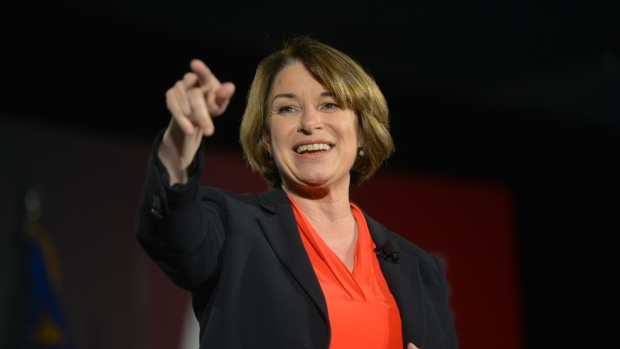Aug 14, 2019
They ‘Wrote the Damn Bill’: 2020 Field Goes on Bill-Filing Blitz
, Bloomberg News

(Bloomberg) -- Half of the 10 members of Congress seeking the 2020 Democratic presidential nomination have already hit career highs in bill-drafting productivity this year, and it’s only August.
One -- Senator Amy Klobuchar of Minnesota -- ranks third in the entire 535-member Congress.
With Republicans controlling the Senate and even lukewarm support from fellow Democrats, few of the bills are likely to be debated, let alone voted on and passed.
But the proposals allow the candidates to stake out territory on issues important to them and burnish their reputations as being unafraid of policy details.
“Even though most voters don’t know the details of the electoral process, they have a sense that their representatives should be doing something,” said Wendy Schiller, a political scientist at Brown University.
And because congressional staff do most of the work, introducing a bill also allows the taxpayer, instead of strained campaign budgets, to pick up part of the cost of developing policy proposals.
“It’s easy to introduce a bill. It doesn’t take much effort. You have a staff member write it up and you drop it into a hopper,” Schiller said. “It’s just called ‘cheap talk’ in political science.”
Introducing bills is an especially attractive messaging tool for Democrats, who believe in the power of government programs and introduce more bills than Republicans, Schiller said.
And introducing legislation allows candidates to define controversial issues on their own terms.
At a debate last month, Representative Tim Ryan of Ohio challenged Vermont Senator Bernie Sanders on whether he really knew that Medicare for All would cover everything. Sanders responded in one of the night’s more memorable lines, “I do know it. I wrote the damn bill.”
The next night, Senator Michael Bennet of Colorado compared his plan to Sanders’ and said, “I wrote the damn public option bill.”
Just before the August recess, the presidential candidates went on a bill-introduction binge: Bennet worked with a congresswoman from Iowa to improve rural broadband service.
Senator Kamala Harris of California introduced bills to legalize marijuana (with Cory Booker of New Jersey and Elizabeth Warren of Massachusetts as co-sponsors), pay for food and housing for college students, and place a moratorium on expanding immigration detention centers.
And the day before the Senate left for summer break, Senator Kirsten Gillibrand of New York introduced an infrastructure bill and a measure proposing paying for lawyers for migrants facing deportation.
But she was in Detroit for the Democratic primary debate that day, so Senate Minority Leader Chuck Schumer, a fellow New York Democrat, introduced the legislation on her behalf.
Indeed, candidates are filing bills even as the demands of the campaign trail mean they’re missing votes. Booker has missed 45% of votes in the Senate this year, followed by Harris (44%), Sanders (40%), Gillibrand (40%), Warren (28%), Bennet (27%) and Klobuchar (23%), according to an analysis by Bloomberg Government.
Klobuchar, who has put forth an ambitious plan for her first 100 days in Congress, has introduced many of the bills she would like to sign into law as president. Only Senators Robert Menendez, a New Jersey Democrat, and Marco Rubio, a Florida Republican, have introduced more bills this year, according to an analysis for Bloomberg News by Govtrack.
Klobuchar’s bills run the gamut of policy areas, from election reforms, climate change, antitrust enforcement, privacy and prescription drugs.
Jonathan Beeton, a spokesman for her Senate office, said Klobuchar has a “longstanding record of legislative action.” He added that more than 100 of her bills have been signed into law, and pointed out that a Vanderbilt University study ranked her as the most effective Democratic senator.
Booker has introduced 47 bills this year, including one to study reparations for slavery.
Sometimes candidates co-sponsor each others’ bills, but other times they’re in competition. Warren submitted her proposal to wipe out as much as $50,000 of student loan debt for borrowers making less than $100,000 a year -- in response to another plan by Sanders that has no caps on student loan cancellation.
Sanders, who’s known for his bold socialist policies, has written 20 bills this session. He set his personal record of 29 bills in 2015, as he was preparing to run for president the first time.
And in 2007, the year before they first ran for president, Hillary Clinton, then a senator from New York, introduced 100 bills and Barack Obama, then a senator from Illinois, introduced 63 -- both personal highs.
--With assistance from Ariel Nerbovig.
To contact the reporter on this story: Gregory Korte in Washington at gkorte@bloomberg.net
To contact the editors responsible for this story: Wendy Benjaminson at wbenjaminson@bloomberg.net, John Harney
©2019 Bloomberg L.P.





